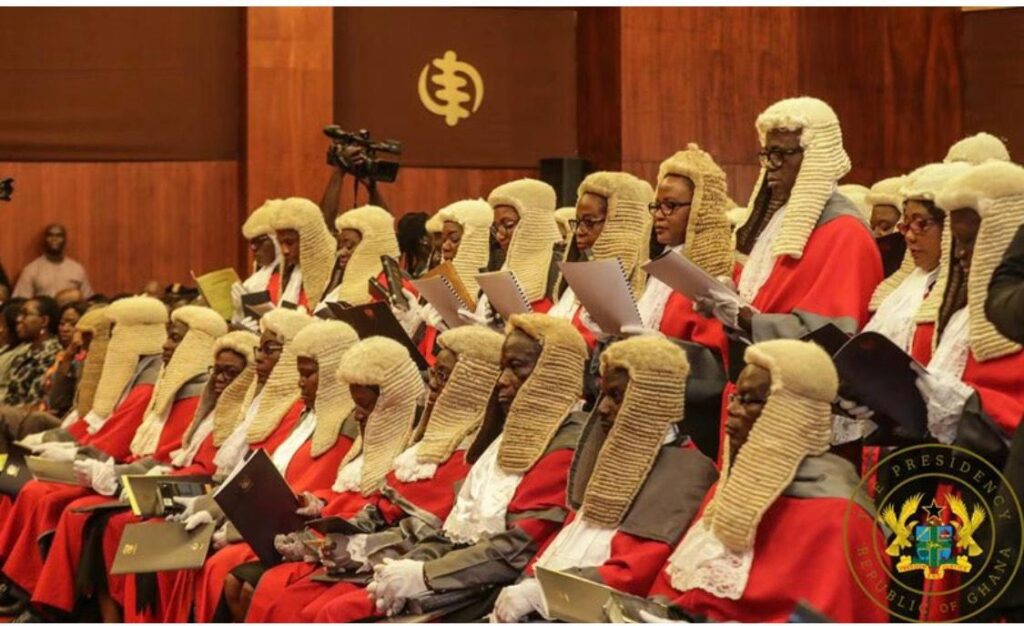Bertha Aniagyei*
Appreciation*
In response to my article on judicial reforms, titled “Strengthening the Rule of Law: The Need for Bold and Inclusive Judicial Reforms,” a thoughtful reader highlighted that the responsibility for certain persistent challenges, particularly the issue of undue delay in adjudication, is a shared one between the judiciary and other stakeholders. I concur with this assessment. This feedback inspired the present paper. I am sincerely grateful to the reader and to all individuals who take the time to engage with my extensive writings and provide invaluable feedback. The paper is divided into four sections, which will be published sequentially to facilitate ease of reading.
The judiciary serves as the cornerstone of justice administration in Ghana. Consequently, research and reports assessing the efficiency and effectiveness of the judiciary in fulfilling its mandate predominantly focus on judges and court personnel.
In the realm of trial expedition and corruption, the judiciary has consistently underperformed, as evidenced by various reports. Persistent complaints and perceptions regarding undue delays in trials and corruption suggest that these issues have become
entrenched.
While responsibility is often attributed to the judiciary, a truer picture, when painted, will reveal that other key stakeholders in the justice administration process, particularly prosecutors and lawyers, also play essential roles in perpetuating the entrenched perception of judicial inefficiency.
Ghana possesses a myriad of legal frameworks that, akin to an architect’s blueprint, can only manifest as tangible realities when effectively implemented and engaged with. The judiciary interprets and applies the law; however, it is the role of lawyers and prosecutors to rigorously challenge, stretch, and gradually expand the boundaries of legal principles.
In pursuing reforms, the judiciary can only make substantial progress in addressing its challenges, particularly the undue delays in trials and the perception of corruption, by collaborating with these relevant stakeholders in the justice sector. It is often stated that if a man wants to travel fast, he travels alone, but if he wants to travel far, he travels with others.
Prosecutors and lawyers function as co-administrators within the justice sector and play a pivotal role in determining the duration of a case. Lawyers, who have been duly admitted to the bar, are regarded as officers of the court and have a duty to assist the courts in the administration of justice.
The purpose of this paper is to delineate the critical roles that prosecutors and lawyers occupy within the justice sector and to illustrate how their challenges and actions impact the seamless administration of justice, particularly regarding corruption and trial delays. It will also elucidate the obstacles, challenges, and frustrations that judges encounter in rendering decisions when other administrators in the justice system fail to fulfill their duties.
INTRODUCTION: Parties and a Cause
For a judge to adjudicate, there must be a cause or matter involving at least two parties. Without parties and a cause, a judge cannot fulfill their duties. I contend that if these parties execute their roles effectively, the challenges faced by the judicial system, particularly delays in cases and corruption, will be significantly mitigated.
In criminal matters, the parties consist of the Republic, represented by prosecutors who are either attorneys from the Attorney General’s Department or police officers authorized by the Attorney General through Executive Instrument 4 of 1976 to initiate summary criminal proceedings in lower courts.
Other agencies that have been delegated prosecutorial powers from the Attorney General include the Social Security and National Insurance Trust (SSNIT) and the Ghana Revenue Authority (GRA). The Office of the Special Prosecutor (OSP) is also endowed with the legal authority to prosecute specified offenses.
In civil matters, the parties typically include private individuals, corporate entities, stools, families, state-owned enterprises, state bodies, and the state itself, which issue writs, petitions, and originating motions against one another seeking various forms of relief.
All these parties approach the court seeking justice. To fulfill its overarching objective of dispensing justice in a fair, equitable, and expeditious manner, the court must collaborate closely with the parties and their legal representatives.
The Public Illusion: A Burden on the Judiciary.
Frequently, the responsibility for various challenges within the justice sector, especially those related to corruption and protracted trial delays, is attributed to the judiciary. This perception arises primarily because it is the court that renders decisions, and parties often perceive themselves, justifiably, as having approached the “court” rather than individual lawyers or prosecutors for justice.
Consequently, they regard the court as the authority endowed with the power to manage and determine the duration of a case, rather than recognizing the roles of lawyers or prosecutors, as well as ancillary matters such as the payment of fees and other court charges as contributing to delays in cases.
In instances where the court adjourns a case due to the absence of counsel or the prosecutor, court users often attribute the adjournment to the court’s actions. When the prosecution fails to produce the accused in court for trial, the complainant typically considers it a delay on the part of the court.
In situations where counsel requests the case to be struck out and the court declines, it may be perceived as the court furthering the prosecution’s agenda and thereby causing delays in trial.
Conversely, when the court dismisses a case for want of prosecution, whether because the prosecution is unprepared to present its witnesses or the prosecutor is absent, the prosecution may view the court as unsympathetic to their numerous challenges, thereby obstructing efforts to ensure public safety from crime and criminals.
In matters of corruption, when a lawyer requests payment from a client as filing fees, the client often perceives that amount, regardless of its quantum, as having been paid to the court, even in scenarios where no receipt of payment has been issued by the court.
When an accused person compensates their counsel by paying legal fees, and the case is prolonged in court, they may attribute the financial burden of legal fees and transportation costs to delays caused by the court.
Similarly, when a complainant unlawfully pays a prosecutor to “incentivize him to pursue the case” or engages a lawyer to watch brief and compensates them, the common sentiment expressed is, “I must pay this money because of my court case.”
Even when a party is aware that they are bribing a judicial staff member, investigator, prosecutor, lawyer, or other individuals to secure a favorable outcome in their case, they often regard the payment as having been made to the judge to further their case and seldom reflect on the criminality of such actions.
There are instances where parties actively seek opportunities to meet with a judge and offer bribes to expedite the hearing of their case and ensure success. When unable to meet with the judge directly, they are often willing to pay prosecutors, investigators, lawyers, drivers, court staff, or anyone who appears to have a connection with the judge for the purpose of delivering the bribe. Consequently, any money exchanged during the lifespan of a case is commonly perceived as having been paid to the court.
In all instances of delay and corruption, the court and, by extension, the judiciary, is viewed as the principal culprit. Although this perception is not entirely accurate, it is difficult to contest.
The ultimate responsibility lies with judges, and unless there is a concerted effort to elucidate court processes and the cascading effects of the roles of all participants, particularly prosecutors and lawyers, in ensuring a smooth and efficient administration of justice, this deeply entrenched perception is likely to persist.
1.0 DELAYS IN TRIALS
Delays in trials are attributed to the numerous adjournments that a case experiences from its initial court date to its final resolution. In both civil and criminal cases, adjournments are granted at the court’s discretion, and such adjournments must be communicated clearly to the parties involved. The regulations are explicit regarding what a court may do in the absence of one or both parties on a subsequent date.
CRIMINAL CASES
According to the Law
In criminal matters, the provisions outlined in The Criminal and Other Offences (Procedure) Act of 1960 (Act 30) govern adjournments and stipulate what a court is permitted to do in the absence of parties.
If an accused person is granted bail pending trial, the court shall not adjourn proceedings for more than thirty (30) clear days. Conversely, if the accused is in detention pending trial, the court shall not adjourn matters for more than fourteen (14) clear days.
Should a prosecutor fail to appear in court on the adjourned date, the court has the option of dismissing the case for want of prosecution, particularly where there is no reasonable justification for the prosecutor’s absence.
THE REALITY – Prosecutors During Daylight Hours, Engaged in General Police Duties During the Nighttime
Police prosecutors frequently submit to the court that they have been assigned to night duty rosters as part of their general police responsibilities. On this note, it is crucial for the administration of the Ghana Police Service to critically evaluate the role of police prosecutors within the overall police structure.
In situations where the court schedules consecutive trial dates, prosecutors typically request adjournments. When such requests are denied, they often conclude their court proceedings by 4:00 PM, attend to their general duties from 6:00 PM to 6:00 AM, and return to court by 8:30 AM. The efficacy of their performance in court following such a demanding schedule remains uncertain.
Necessary Adjournments
When a prosecutor provides a legitimate justification for an absence, the court may adjourn the case to a specified date and time, which must be communicated to both parties. It is pertinent to note that what constitutes a reasonable excuse is determined on a case-by-case basis.
I posit that such justifications should be presented to the court in a timely manner, preferably before the court convenes, to prevent the accused and their counsel from waiting all day in anticipation of a trial that may ultimately be adjourned.
Absence of the Accused Person
Conversely, if the accused fails to appear on the adjourned date, the court may issue a bench warrant for their immediate arrest and production in court, adjourn the case, or proceed with the trial in accordance with Article 19(3) of the Constitution of 1992, which permits trial in absentia.
The situation becomes more complex when the accused is detained in custody, either due to being deemed a flight risk and remanded pending trial or having been granted bail but failing to meet the requisite conditions.
In such cases, the absence of the accused cannot be attributed to them, but rather to the prosecution. The reasons for this are multifaceted and warrant further elaboration.
Inadequate Means of Transportation
Numerous judges, lawyers, and individuals in the courtroom have encountered prosecutors who submit, “My Lord, the investigator did not produce the accused today because the station vehicle has broken down and is yet to be repaired; there is only one station vehicle, and the commander has taken it for a meeting; or the station vehicle lacks fuel to transport the accused.”
Other common justifications include, “The investigator relies on a taxi, which he pays for personally to transport the accused to and from court, but he lacks funds today; there is a directive that no accused person on remand should be transported in a vehicle other than a police vehicle, and currently, no police vehicle is available; the investigator has been assigned to other duties and could not produce the accused; or the investigator is on leave, and the station officer has not designated another investigator to the case.” The list of excuses for the non-appearance of incarcerated individuals in court is extensive.
Fear of Repercussions
It is important to note that, according to police service regulations, if any police officer loses a suspect or accused person in their custody, they are typically afforded a few days to produce the individual or face disciplinary actions that may lead to dismissal.
With this context in mind, even when an investigator and prosecutor are eager to assist the court in dispensing justice by ensuring that an accused person in custody is brought to court through alternative means of transport, the fear of potential career repercussions should an escape occur is significant. Consequently, many prefer to keep an accused individual in custody until official transportation is arranged.
In such circumstances, the knowledge that the absence of the accused is not attributable to them or directly to the prosecution complicates the judge’s role. A court cannot proceed with a trial in absentia under these conditions.
Uneasy Lies the Head that Wears the Crown
Given this context, does the court apply the law and discharge the accused on the grounds that the prosecution’s inability to produce them infringes on their fundamental human right to a fair trial within a reasonable time, or does the court continue to grant adjournments for no more than fourteen clear days until the prosecution can produce the accused in court?
In deliberating on the appropriate course of action, the court is also confronted with the reality that dismissing the charge results in a discharge rather than an acquittal of the accused. A dismissal does not bar further prosecution, allowing the prosecution to return to the police cells, inform the accused of their discharge, release them, and subsequently re-arrest them for the same or a similar charge, thereby initiating the criminal process anew.
This situation also applies in instances where the accused and/or their counsel are present in court, and the court discharges the accused due to delays occasioned by the prosecution. Should the court discharge the accused, fully aware that the prosecution can immediately re-arrest them upon exiting the courtroom, or should it continue to grant adjournments?
If the court opts to grant adjournments, it must grapple with the reality that the transportation excuse may not always be valid, and indulging the prosecution could allow unscrupulous elements within the prosecution to exploit the rights of the accused.
For the Love of God and Country
I will briefly digress here to note that many prosecutors and investigators go above and beyond their duties, often using their personal funds to support accused persons in custody. It has become commonplace to hear them state that they provide food for the accused from their own resources.
Unfortunately, they do not receive reimbursements from the police administration. There are instances where silver collections must be made in open court (the bar must be commended for its consistent support in this regard) to assist in feeding accused individuals who are in police custody.
For this reason, some prosecutors advocate for detention in prison custody, as prisons provide meals for inmates. However, while detention in prison custody may resolve the issue of feeding the accused, it introduces other complications.
Fork in the Road: Prison Custody
When an accused is in prison custody, warrants must be served on the gaolers (Director of Prisons) to produce them in court on all adjourned dates (Section 64 of the Courts Act, 1993 (Act 459)).
Beyond transportation issues faced by prisons, there are instances where accused individuals are brought to court late due to necessary practices within the prisons, such as morning headcounts and breakfast routines that must be completed before any inmate can be released.
Furthermore, when in court, the court must consider the lunch schedules of prisoners, as lunch is not reserved for those out of custody. Therefore, the court must endeavor to accommodate the prison schedule to ensure that an accused person is returned in time to allow for their meal.
Failure to do so may result in a silver collection being required in court to feed the accused, or they may go hungry in the afternoon unless prison officers generously decide to procure food for them on their return.
Lack of Formal Training
There exists a notable absence of formal training for police prosecutors. This situation is somewhat analogous to the historical practices within the Inns of Court, where individuals aspiring to become lawyers would undertake apprenticeships under the guidance of established lawyers, learning through observation and experience.
In contrast, police officers acquire prosecutorial skills predominantly through on-the-job training. However, this process differs significantly from traditional apprenticeships, as police officers are not formally assigned to prosecutors for educational purposes.
Instead, they serve as Court Warrant Officers (C.W.O) at junior ranks, primarily responsible for providing security during court proceedings while simultaneously observing the legal processes.
Upon promotion to the rank of sergeant or inspector, the Judicial Police (JUPOL) assigns some of these officers prosecutorial responsibilities, based on the assumption that their prior observations have sufficiently prepared them for such duties.
Although there may be opportunities for on-the-job training, typically sponsored and facilitated by external organizations such as the Law Development Association (LADA) the effectiveness of this training can vary and is heavily dependent on the availability of external funding.
Consequently, many prosecutors may not possess adequate legal knowledge and often encounter significant challenges, leading to frequent errors in their work. It is not uncommon for a charge sheet to undergo multiple amendments throughout the course of proceedings.
Clerical errors in charge sheets have become routine, and prosecutors frequently struggle with identifying the appropriate charges or legal frameworks under which to prosecute an accused individual. Such amendments contribute to prolonged court proceedings and ultimately result in delayed trials.



